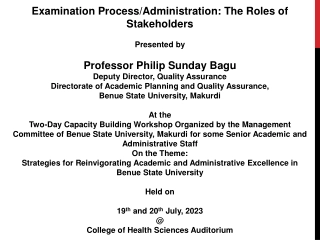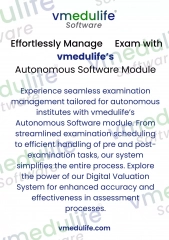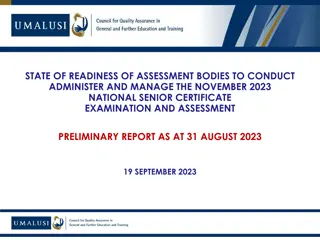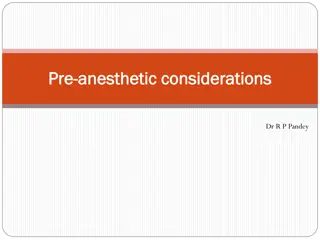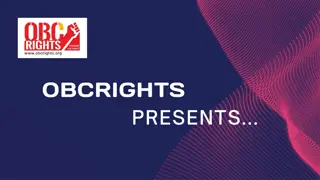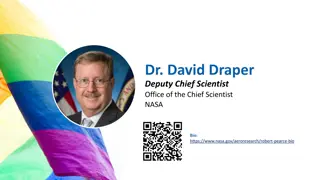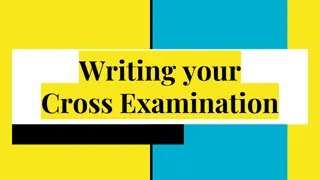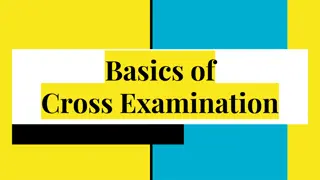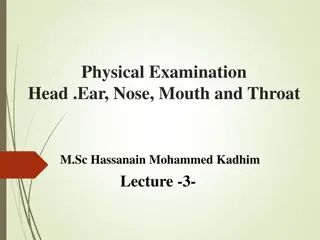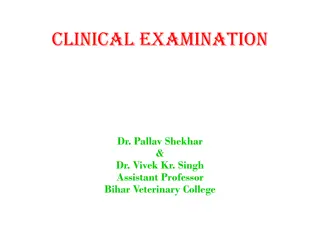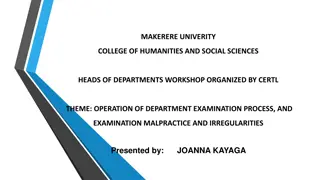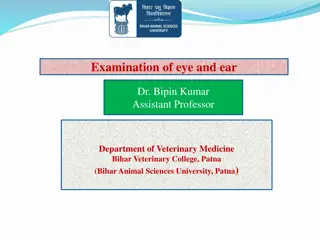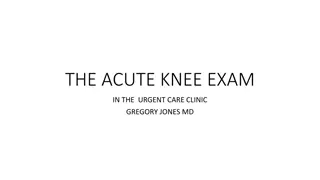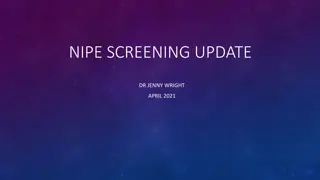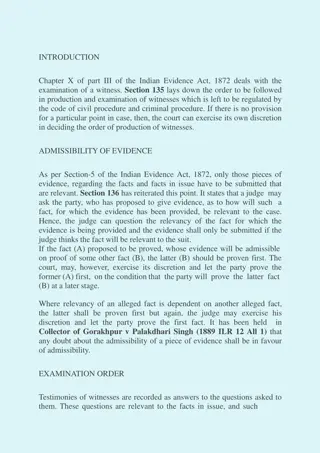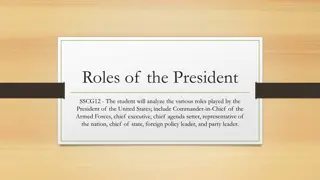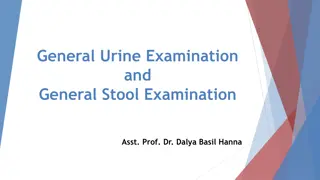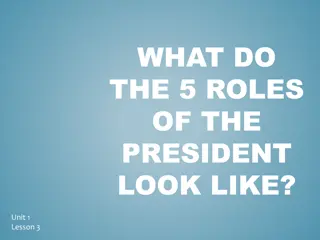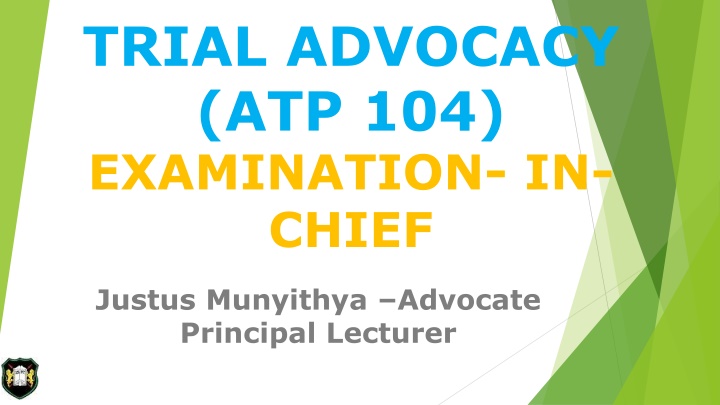
Understanding Examination-in-Chief in Trial Advocacy
Explore critical issues, statutory basis, and techniques of examination-in-chief in trial advocacy, including expert witnesses, hostile witnesses, and production of documents. Learn about the questioning of witnesses, statutory provisions, and the significance of leading questions in the examination process.
Download Presentation

Please find below an Image/Link to download the presentation.
The content on the website is provided AS IS for your information and personal use only. It may not be sold, licensed, or shared on other websites without obtaining consent from the author. If you encounter any issues during the download, it is possible that the publisher has removed the file from their server.
You are allowed to download the files provided on this website for personal or commercial use, subject to the condition that they are used lawfully. All files are the property of their respective owners.
The content on the website is provided AS IS for your information and personal use only. It may not be sold, licensed, or shared on other websites without obtaining consent from the author.
E N D
Presentation Transcript
TRIAL ADVOCACY (ATP 104) EXAMINATION- IN- CHIEF Justus Munyithya Advocate Principal Lecturer
Critical issues Meaning; Statutory basis; Objectives; Techniques; Expert witness; Hostile witness; Unfavorable witness; Production of documents.
What is examination-in-chief? Questioning of a witness by the party who has called the witness to give evidence, in support of the made. It is the first examination after the witness has been sworn or affirmed. case being
What is the statutory basis? Section Act:-The examination of a witness by the party who calls him shall be called his examination-in-chief. Section 146 (1):- gives the order in which examination of witnesses occurs, the witnesses shall first be examined-in- chief, then, if the desires, cross-examined, party calling them examined. 145 (1) of the Evidence adverse party so the re- then, desires, if so
Statutory basis Cont. Section 149:- Leading Questions are defined as suggesting the answer which the person putting it wishes or expects to receive, or suggesting a disputed fact as to which the witness is to testify. Any question
Statutory basis Cont. Section 150 (2) and Section 151 : provides for the instances in which leading questions can They include: As to matters introductory or undisputed, or; Which have in its opinion been already sufficiently proved. be asked. which are
Statutory basis Cont. Section 161:- the court may, in its discretion, permit the person who calls a witness to put any questions to him which might be put in cross-examination by the adverse party Order 18 Rule Procedure Rules: The evidence of the witnesses in attendance shall be taken orally in open court in the presence of and under the personal direction and superintendence of the judge. 3 of the Civil
Statutory basis Cont. Section 150 of Criminal procedure Code:- A court may, at any stage of a trial or other proceeding under this Code, summon or call any person as a witness, or examine any person in attendance though not summoned as a witness, or recall and re-examine a person already examined, and the court shall summon and examine or recall and reexamine any such person if his evidence appears to it essential to the just decision of the case Provided that the prosecutor or the advocate for the prosecution or the defendant or his advocate shall have the right to cross-examine any such person, and the court shall adjourn the case for such time (if any) as it thinks necessary to enable the cross-examination to be adequately prepared if, in its opinion, either party may be prejudiced by the calling of that person as a witness.
What are the Objectives? Support your case. Fortify credibility of your witness. Build a coherent witness. Limit the exposure witnesses testimonies. Lay foundation exhibits story for the of the for presenting
What are the techniques? Ask non-leading questions. Restrict each question to one material fact. Use transitions. Employ piggyback. Use both open and closed ended questions.
Expert witness a witness qualified skill, by knowledge, training, or education to provide a scientific, technical or other specialized opinion evidence or a fact issue experience, about the
Expert cont. Any person who is called to assist the Court in forming an opinion upon a point of foreign law, or of science or art, or as to identity or genuineness of handwriting or impressions, opinions upon that point are admissible if made by persons specially skilled in such foreign law, science or art, or in questions as to identity or genuineness of handwriting or finger or (Section 48 of Evidence Act) finger or other other impressions
Expert cont. An expert must: Be shown to be competent; Have a special subject or have long experience on the subject matter; The court has to be satisfied that the person before it is an expert and the matter before it requires expert evidence study of the
Expert cont. Section opinions as to customs or rights are admissible if made by a person likely to know the existence existence of the particular custom Section 52:- Opinions as to persons having facts of any association, body of men or family or the constitution or government of religious organization 51(1) of Evidence Act:- or non- a charitable or
Techniques in examining an expert Ask qualifications. Ask what they examined. Ask about employed. Ask what their conclusion was. questions to elicit their the methodology
Hostile witnesses a witness who appears unwilling to tell the truth sworn in to give evidence in court. A witness is declared hostile by the Court and examined by the party calling them. after being can be cross
Unfavorable witness A witness who either fails to prove that which he was expected to prove or who gives evidence unfavorable to the party by whom called. The general rule is that the party calling the witness may not impeach his credibility but may only call other witnesses to prove that which the unfavorable witness failed to prove. he has been
Production of documents. In civil cases, plaint is accompanied by a number of documents such as: List of witnesses; Witness statements; List of documents; Bundle of documents. These documents must be filed on time lest leave is sought for their filing.
Technique for Production of documents in civil cases. Create a foundation; Refer the witness to the relevant page on which the document is; Ask authentication questions; Ask the witness about the content of the document. Note: currently the documents once filed and pleadings exchanged the parties are deemed to have notice of the bundle of the documents and parties are allowed to adopt the document without having to procedure. undergo the above
Production of documents in criminal cases. In criminal cases, the prosecution is under duty to file all the documents that it seeks reliance in proving its case. The documents are marked as exhibits Where a witness who is not competent to produce a documents speaks to its content, then the document is marked for identification (MFI)

